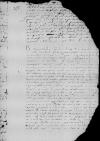List #2462
[Ioannes DANTISCUS] do [Tiedemann GIESE]Heilsberg (Lidzbark Warmiński), 15[41]-07-18
Regest polski:
Dantyszek obiecuje Giesemu, że jeszcze tego samego dnia napisze do podkanclerzego [Samuela Maciejowskiego] w sprawie błędu w liście królewskim [do księcia Albrechta ws. objaśnienia praw Dantyszka do części majątku po Georgu Langerbeinie, kapłanie z jego diecezji, który zmarł jako apostata, cf. IDL 2457], polegającego na braku zapowiedzianego w treści dokumentu podpisu królewskiego. Poprosi o wystawienie nowego, który albo będzie miał podpis władcy, albo podpis zastępczą ręką (vicaria manu) podkanclerzego.
O ile Giese wskazałby kandydatów na komisarzy, Dantyszek mógłby postarać się o powierzenie im sprawy sporu o granice z podskarbim [Stanisławem] Kostką, sugeruje jednak drogę polubowną. Radzi, by Giese spróbował porozumieć się z Kostką prywatnie, w czym może pomóc okazanie dokumentu królewskiego, który w tym celu Dantyszek odsyła. Jego zdaniem Kostka nie sprzeciwi się odłożeniu sprawy do czasu przyszłego sejmu [pruskiego].
Dantyszek nie doczekał się do tej pory opinii kasztelana gdańskiego [Achacego Cemy] w sprawie starosty rogozińskiego [Stanisława Sokołowskiego]. Zamierza opisać sprawę podkanclerzemu. Powiadomi adresata o odpowiedzi.
Nowiny na razie nie nadeszły, wkrótce jednak spodziewa się ich w obfitości. Prosi o przekazywanie wieści, które trafią do adresata i obiecuje wzajemność.
Wracając na koniec listu do sprawy sporu z Kostką, Dantyszek deklaruje poufnie, że nie uważa za właściwe, by komisarze obrani nie po myśli Giesego mieli takie samo prawo do głosu jak on. Zaleca jednak pogodzenie się z tym, że w sprawie dotyczącej dóbr królewskich władca może wyznaczyć sędzią kogo zechce, choć radcy pruscy prosili, by król nie wyznaczał komisarzy [z pominięciem ich] opinii.
Rękopiśmienne podstawy źródłowe:
| ||||||
Tekst + aparat krytyczny + komentarz Zwykły tekst Tekst + komentarz Tekst + aparat krytyczny
Reverendissime in Christo Pater et Domine, frater et amice carissime ac honorande.
Salutem et fraternam commendationem.
Hodie cf.
Si nomina commissariorum contra dominum
De
Rerum novarum nihil item in praesens apud me est, quarum paulo post ingens adferetur cumulus. Si quid prius Dominatio Vestra Reverendissima acceperit, me faciat participem, similiter a me exspectet.
Commisarii Dominationi Vestrae Reverendissimae additi, cum ex consilio vestro non sint, indignum mihi videtur, quod pares in suffragiis cum Dominatione Vestra Reverendissima admittuntur. Cum autem quaestio est de bonis regiis, ad quae, qu[em] vult,
D[ominationem] [Vestram] [Reverendissimam] diutissime sospitem et felicem esse meque illi intime commendatum [haberi] ex animo cupio.
